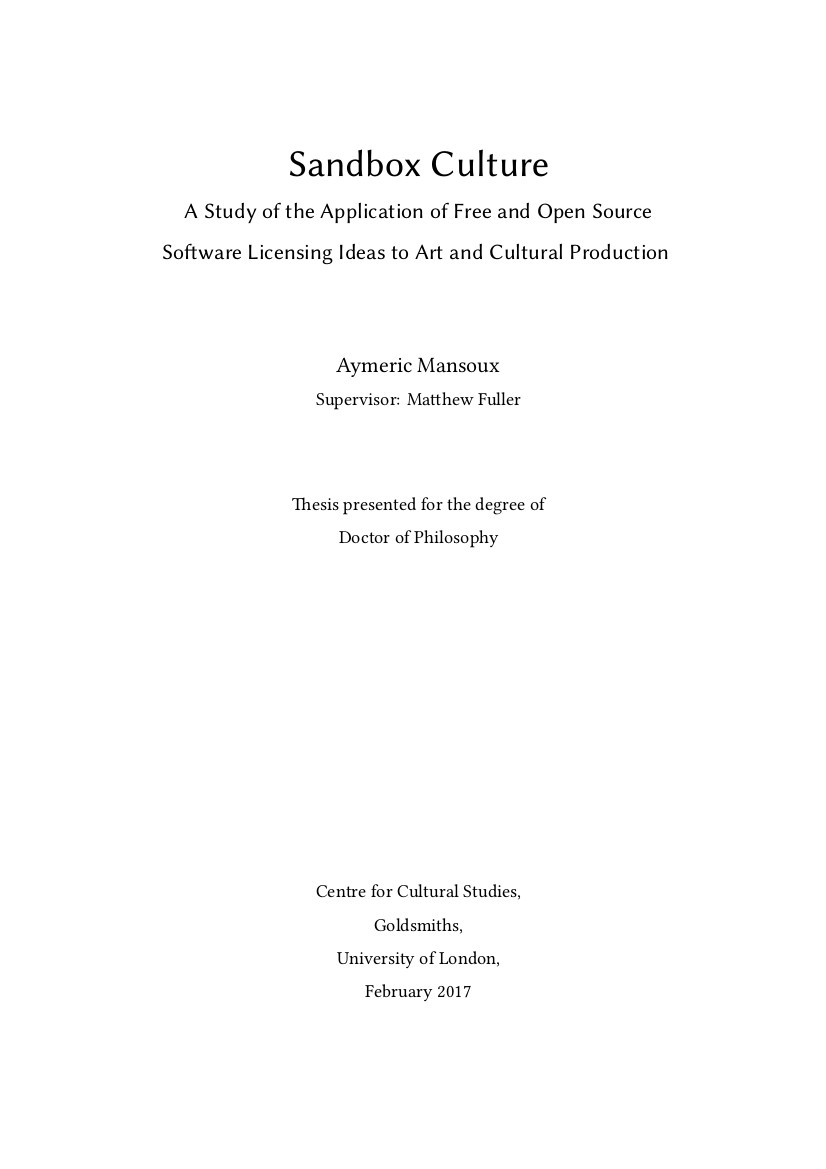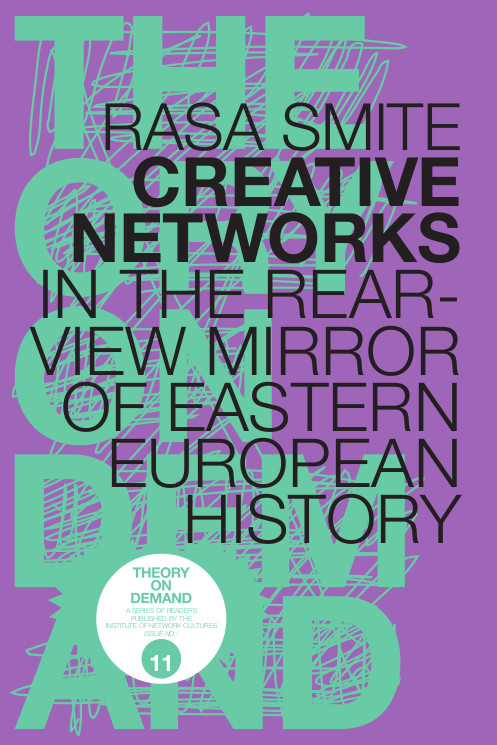Aymeric Mansoux: Sandbox Culture: A Study of the Application of Free and Open Source Software Licensing Ideas to Art and Cultural Production (2017)
Filed under thesis | Tags: · agonism, copyright, cultural production, digital culture, floss, free culture, intellectual property, law, network culture, open source, social movements

“In partial response to the inability of intellectual property laws to adapt to data-sharing over computer networks, several initiatives have proposed techno-legal alternatives to encourage the free circulation and transformation of digital works. These alternatives have shaped part of contemporary digital culture for more than three decades and are today often associated with the “free culture” movement. The different strands of this movement are essentially derived from a narrower concept of software freedom developed in the 1980s, and which is enforced within free and open source software (FLOSS) communities. This principle was the first significant effort to articulate a reusable techno-legal template to work around the limitations of intellectual property laws. It also offered a vision of network culture where community participation and sharing was structural.
From alternate tools and workflow systems, artist-run servers, network publishing experiments, open data and design lobbies, cooperative and collaborative frameworks, but also novel copyright licensing used by both non-profit organisations and for-profit corporations, the impact on cultural production of practices developed in relation to the ideas of FLOSS has been both influential and broadly applied. However, if it is true that FLOSS has indeed succeeded in becoming a theoretical and practical model for the transformation of art and culture, the question remains at which ways it has provided such a model, how it has been effectively appropriated across different groups and contexts and in what ways these overlap or differ.
Using the image of the sandbox, where code becomes a constituent device for different communities to experience varying ideologies and practices, this dissertation aims to map the consequent levels of divergence in interpreting and appropriating the free and open source techno-legal template. This thesis identifies the paradoxes, conflicts, and contradictions within free culture discourse. It explores the tensions between the wish to provide a theoretical universal definition of cultural freedom, and the disorderly reality of its practice and interpretation. However, despite the different layers of cultural diffusion, appropriation, misunderstanding and miscommunication that together form the fabric of free culture, this dissertation argues that, even though feared, fought, and criticised, these issues are not signs of dysfunctionality but are instead the evidence of cultural diversity within free culture. This dissertation will also demonstrate that conflicts between and within these sandboxes create a democratic process that permits the constant transformation of the free and open source discourse, and is therefore something that should be embraced and neither resisted nor substituted for a universal approach to cultural production.”
Includes an anthology of proto-free culture licenses, 1998-2002 (pp 382-452).
PhD Dissertation
Supervisor: Matthew Fuller
Publisher Centre of Cultural Studies, Goldsmiths, University of London, 2017
xxxviii+486 pages
via author
Rasa Smite: Creative Networks: In the Rearview Mirror of Eastern European History (2011/2012)
Filed under book | Tags: · actor-network theory, cyberfeminism, eastern europe, internet, internet art, internet culture, latvia, media art, net art, network culture, networks, sound art, virtual communities

“Creative Networks explores the dawn of the Internet culture in the age of network society from the perspective of Eastern Europe. From a theoretical angle the networks are introduced and interpreted as complex socio-technical systems. The author analyzes the development of these networked self-organized formations starting off with ‘virtual communities’ of ‘creative networks’, which emerged during the early phase of the Internet, up to the phenomena of today’s online ‘social networks’. Along with the translocal case studies of Nettime, Syndicate, Faces and Xchange networks (as well as with the other important facets of the 1990s network culture in Europe), the author studies also local community networking case of alternative and digital culture that evolved around E-Lab in the 1990s in Latvia. By focusing primarily on the network culture of 1990s, this study reflects those changes in the social structure of today’s society that are occurring under the process of socio-technical transformation.
The book is based on a dissertation by Rasa Smite, with the title Creative Network Communities and was defended in Riga Stradins University, February 2011.”
First published in Latvian in Riga: RIXC and Liepaja: LiepU MPLab, 2011.
Translated by Linda Vebere
Publisher Institute of Network Cultures, Amsterdam 2012
Creative Commons Attribution Noncommercial No Derivative Works 3.0 Netherlands License
ISBN 9789081857505
160 pages
Review: Piibe Piirma (Baltic Screen Media Review, 2014).
PDF (updated on 2023-9-27)
Comment (0)Adrian Mackenzie: Wirelessness: Radical Empiricism in Network Cultures (2010)
Filed under book | Tags: · locative media, network culture, networks, technology, wireless networks

How has wirelessness—being connected to objects and infrastructures without knowing exactly how or where—become a key form of contemporary experience? Stretching across routers, smart phones, netbooks, cities, towers, Guangzhou workshops, service agreements, toys, and states, wireless technologies have brought with them sensations of change, proximity, movement, and divergence. In Wirelessness, Adrian Mackenzie draws on philosophical techniques from a century ago to make sense of this most contemporary postnetwork condition. The radical empiricism associated with the pragmatist philosopher William James, Mackenzie argues, offers fresh ways for matching the disordered flow of wireless networks, meshes, patches, and connections with felt sensations.
For Mackenzie, entanglements with things, gadgets, infrastructures, and services—tendencies, fleeting nuances, and peripheral shades of often barely registered feeling that cannot be easily codified, symbolized, or quantified—mark the experience of wirelessness, and this links directly to James’s expanded conception of experience. “Wirelessness” designates a tendency to make network connections in different times and places using these devices and services. Equally, it embodies a sensibility attuned to the proliferation of devices and services that carry information through radio signals. Above all, it means heightened awareness of ongoing change and movement associated with networks, infrastructures, location, and information.
The experience of wirelessness spans several strands of media-technological change, and Mackenzie moves from wireless cities through signals, devices, networks, maps, and products, to the global belief in the expansion of wireless worlds.
Publisher MIT Press, 2010
ISBN 0262014645, 9780262014649
255 pages
PDF (updated on 2012-7-15)
Comment (1)
